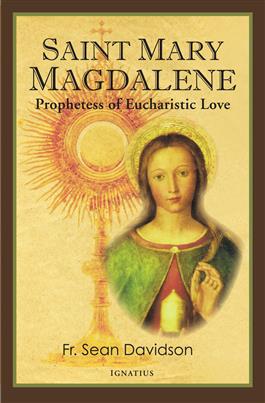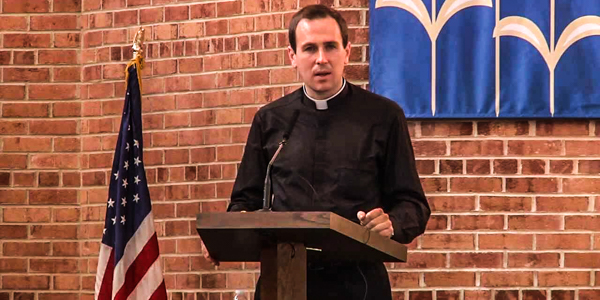A year ago, Pope Francis raised to a liturgical feast the memorial of St. Mary Magdalene, July 22. What’s so special about Mary Magdalene and how can she help us know Jesus better?
We asked Fr. Sean Davidson, a member of the Missionaries of the Most Holy Eucharist, who has lived in the shadow of the Basilica of St. Mary Magdalene in Provence and is the author of Saint Mary Magdalene: Prophetess of Eucharistic Love.

Kathryn Jean Lopez: How is Mary Magdalene “Prophetess of Eucharistic Love”? What should the average Catholic’s relationship to her be? Why should they even have one?
Fr. Sean Davidson: In the book I presented her as one who adores and loves Christ most ardently. Since we meet the very same Christ in the mystery of the Eucharist, she is a model for us, teaching us how to relate to Him in a manner that is pleasing to Him. I am personally very fond of the writings of St. Peter-Julian Eymard, the great apostle of Eucharistic Adoration, who always tried to use the Gospel encounters as examples showing us how to encounter the Lord in the Blessed Sacrament today.
This is the way I like to ponder the Scriptures. The biblical texts which the Catholic tradition, especially the Provençal tradition, associated with St. Mary Magdalene are among the best we can use for inspiration while spending time with the Lord.
At this point, it is probably helpful to mention that the Provençal tradition identifies Mary Magdalene with the sinful woman who wept at Christ’s feet in chapter seven of the Gospel of Luke, as well as with the sister of Martha and Lazarus. This may come as a surprise to many today, especially since the contemporary liturgy of the Church no longer makes that association. (The Tridentine liturgy still adheres to the traditional identification.) I am certainly no biblical scholar, but in the book, I used the teachings of French exegete, Fr. Andre Feuillet, to show that this tradition is perfectly coherent with the Gospels, even if no Catholic is obliged to accept it today. The biblical debate about her identity is still open.
If the traditional identification is correct, then this woman has a lot to teach us about the kind of reverence and love we should have in the presence of Jesus Christ. If love can be measured by the degree of attentiveness to the other, then her love for Christ is perfect. We would do well to invoke her assistance as we try to be attentive to Him in Holy Communion and Eucharistic Adoration. In addition to this, there is something even more mysterious that lies hidden deep within these texts. What stood out for me when I meditated upon these Gospel scenes was that there is a strong prophetic dimension to Mary Magdalene’s vocation. She is a prophetess who speaks by means of love. A prophet is one through whom the Holy Spirit communicates; at times by means of words, at times by means of gestures. A prophet will often foretell an impending event of great significance; and at times, a prophet will rebuke sinful behavior, exposing to the world how the Lord has been offended. Without going into it in great detail, we can see that Magdalene does both of these things. In the first anointing scene, her gestures of love had been inspired so as to highlight the fact that the Pharisee had neglected to show Jesus the signs of honor he was due. Jesus’ words subsequently interpreted the meaning of her prophetic gesture. (Luke 7:44-46) In the second anointing scene, just before the Passion, her gestures of love foretell the arrival of Christ’s salvific death. Again, the words of Jesus interpret the gesture. (Mark 9:4) She is a prophetess who silently communicates by means of the expression of her love.

Read more:
Mary Magdalene, a heart close to Christ
After the Resurrection, she will give words to her prophesying, foretelling the mystery of Christ’s ascension to the Father. (John 20:17) In my opinion, she is the prototype of prophetic women in the Church. There is a reason why women like St. Teresa of Avila were so influenced by the traditional image of St. Magdalene. St. Thomas Aquinas makes a rather astonishing statement about her dignity: “Notice the three privileges given to Mary Magdalene. First, she had the privilege of being a prophet because she was worthy enough to see the angels, for a prophet is an intermediary between angels and the people. Secondly, she had the dignity or rank of an angel insofar as she looked upon Christ, on whom the angels desire to look. Thirdly, she had the office of an apostle; indeed, she was an apostle to the apostles insofar as it was her task to announce our Lord’s resurrection to the disciples.”
Lopez: What long-term impact has serving at the Basilica of St. Mary Magdalene in Provence, France, had on your life?
Fr. Davidson: It was a time of great importance for me. Not only did I learn from Magdalene about love for Christ, I also recall experiencing something of the joy of the Resurrection during that time. It was still dark when Mary Magdalene approached the tomb on Easter Sunday morning, yet Christ was already risen. The world may be filled with darkness today, but with her help, I came to experience the joy of having the same Risen Lord still with us in the Blessed Sacrament. In every one of our churches, we can bathe in the consoling spiritual light emanating from Christ’s Risen Body. No darkness in this world, or in our lives, can ever overcome this Eucharistic light. From his tabernacle, we can almost hear Christ whisper to our weary souls: “In the world you have tribulation; but be of good cheer, I have overcome the world.” (John 16:33)

